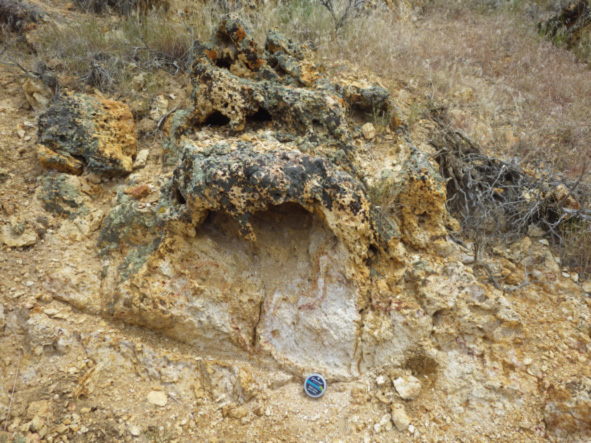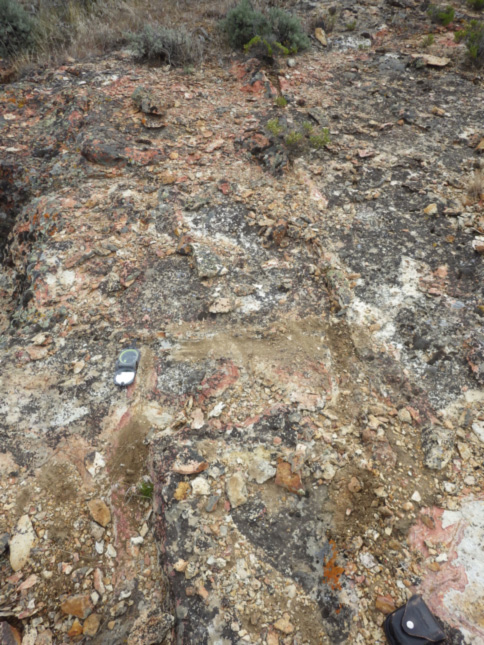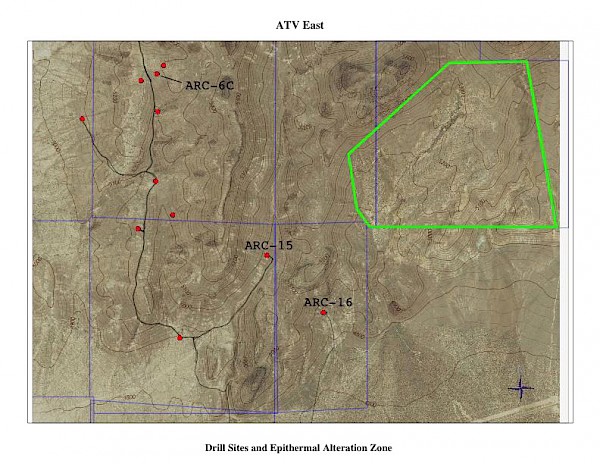NV Gold Provides Update of Exploration at its ATV Gold Project, Nevada
Vancouver, British Columbia – NV Gold Corporation (TSX:V: NVX) (“NV Gold” or the “Company) has recently completed follow up drilling and received analyses from its second diamond core hole ARC-6C at its 100% controlled Across-the-Valley (“ATV”) Gold Project in north-central Nevada.
As reported by the Company in news releases dated March 1, 2018, hole ARC-6C intercepted a sequence of laminated muddy to silty carbonate-bearing rocksinterpreted to belong to the lower plate of the Roberts Mountain thrust fault. NV Gold chose to extend this hole to provide a more thorough test of stratigraphy in this area (please refer to the news release dated March 2, 2018 for further details). This hole was terminated at 859.5 m (2,820 ft) as discussed in a news release dated April 5, 2018.
After penetrating 239.4 m of Tertiary volcanic rocks, hole ARC-6C intercepted Paleozoic siliciclastic sedimentary rocks thought to belong to the upper plate of the Roberts Mountain thrust fault. Between 346-358 m, a zone of intense shearing, interpreted to represent the Roberts Mountain thrust fault was encountered. Below this and continuing to a depth of approximately 488 m, a sequence of laminated muddy to silty carbonate-bearing rocks interpreted to be part of the lower plate of the Roberts Mountain thrust fault was intercepted. Siliciclastic rocks, some moderately calcareous, and including short intervals of igneous rocks, possibly mafic lava flows of dikes, persisted to the end of the hole at 859.5 m. This lower sequence of siliciclastic rocks is believed to possibly be a fault repetition of the upper plate assemblage.
Anomalous gold (10-34 ppb) and trace elements (2-5 ppm silver, up to 77 ppm arsenic, up to 85 ppm molybdenum, up to 18 ppm antimony, and up to 25 ppm selenium) accompany a zone of clay alteration, decalcification and fine-grained pyrite from 359.8-399.4 m. Additional altered zones with similarly elevated pathfinder elements were encountered from 425.8-430.8 m, 533.2-549.1 m, 589.8-597.0 m, 617.6-619.6 m (includes 19.5 ppm Ag), 818.9-826.4 m, and 842.2-859.5 (end of hole). No potentially economic gold grade mineralization was encountered.
A persistent presence of elevated selenium and molybdenum is notable in the pathfinder elemental suite as are silver values commonly over 1 ppm. NV Gold interprets this to possibly reflect the signature of a mid-Miocene epithermal system rather than an older Carlin-type system where these elements would be expected to be relatively low and arsenic, antimony and mercury much higher. Notable selenium, molybdenum and silver are present at the nearby mid-Miocene Ken Snyder and Mule Canyon epithermal gold deposits.
Recent field reconnaissance by NV Gold geologists in an area approximately 2.5 km southeast of hole ARC-6C has identified an area approximately one km across encompassing high-level epithermal silica and clay alteration in Miocene volcanic rocks (see Figures 1&2). Although distal, NV Gold believes it is possible that the altered and trace element anomalous zones encountered in hole ARC-6C may be connected to this hydrothermal center. Detailed mapping of this newly discovered zone is currently being undertaken and a soil sampling program has just been completed over the core of this area.
Additional Drilling
In addition to hole ARC-6C, NV Gold has recently completed three additional holes at ATV, diamond drill hole ARC-14C and reverse circulation drill holes ARC-15 and ARC-16 (see Figure 3).
Hole ARC-14C, situated approximately 0.8 km north of ARC-6C, was pre-collared to a depth of 256 m utilizing a reverse circulation drill, then extended by diamond core to a depth of 467.6 m. Paleozoic siliciclastic rocks thought to belong to the upper plate of the Roberts Mountain thrust fault were encountered from 182.9-467.6 m. Hydrothermal alteration was not observed in these rocks.
Hole ARC-15, situated approximately 1.85 km southeast of ARC-6C, was drilled to a depth of 323.1 m encountering Miocene volcanic rocks to a depth of 192.0 m and Paleozoic siliciclastic rocks to the end of the hole. Hole ARC-16, situated approximately 2.5 km southeast of ARC-6C, encountered Miocene volcanic rocks to the end of the hole at 301.8 m. Hydrothermal alteration including clay alteration and silicification were noted from 18.3-182.9 m in hole ARC-15 and from 234.7-301.8 m in hole ARC-16 and may be related to the newly discovered zone of epithermal alteration discussed above.
Analyses from holes ARC-14C, ARC-15 and ARC-16 are expected back in the next 3-5 weeks.
NV Gold’s CEO, John Watson commented “Although results from ARC-6C are disappointing, we feel we adequately tested the potential for buried Carlin mineralization in the central part of the ATV property. We now recognize that the alteration and anomalous trace elements observed in this hole likely reflect an overprinting from a mid-Miocene epithermal system mapped to the east. Recent field reconnaissance has identified a one km wide zone of high-level epithermal alteration in the southeastern part of the project area approximately 2.5 km away from hole ARC-6C. We have already completed a soil sampling program over this new zone and will evaluate it further through detailed mapping. Further drilling will be considered once this data is in hand.”
Quality Control and Quality Assurance
NV Gold staff, under the supervision of Dr. Quinton Hennigh, a director of NV Gold oversaw drilling and drill sampling discussed in this news release. RC samples were submitted to ALS Global, Reno, Nevada (“ALS”) where they were crushed, pulverized and analyzed. Gold was determined by fire assay of a 30 gram charge with an ICP finish. Trace element analyses were performed on pulps subjected to 3-acid digestion followed by mass spectrometric analysis. Diamond core was marked for sampling by NV Gold staff then submitted to ALS for sawing and sampling. Half splits of core were crushed, pulverized and analyzed under the same procedure as RC samples. Standard and blanks were systematically introduced into the sample stream.
Quinton Hennigh (Ph.D., P.Geo.) is a Qualified Person pursuant to National Instrument 43-101 and has reviewed and approved the technical information contained in this news release. Dr. Hennigh is a director of NV Gold and is not independent and is also the President, Chairman and a Director of Novo Resources Corp.
About NV Gold Corporation
NV Gold is a junior exploration company based in Vancouver, British Columbia that is focused on delivering value through mineral discoveries utilizing the prospector generator model. Leveraging its highly experienced in-house technical knowledge, NV Gold’s geological team intends to use its geological database, which contains a vast treasury of field knowledge spanning decades of research and exploration, combined with a portfolio of mineral properties in Nevada, to create opportunities for lease or joint venture. NV Gold plans to aggressively acquire additional land positions for the growth of its business.
On behalf of the Board of Directors,
John E. Watson
President and CEO
For further information, visit the Company’s website at www.nvgoldcorp.com or contact:
John E. Watson,
Phone: 303.674.9400
Email: john@nvgoldcorp.com
Neither the TSX Venture Exchange nor its Regulation Service Provider (as that term is defined in the policies of the TSX Venture Exchange) accepts responsibility for the adequacy or accuracy of this release.
Forward Looking Statements
This news release includes certain forward-looking statements or information. All statements other than statements of historical fact included in this release, including, without limitation, statements regarding interpretations of rock formations, including that any rock belongs to one of the plates of the Roberts Mountain thrust fault or a fault repetition thereof, or may reflect the signature of a mid-Miocene epithermal system rather than an older Carlin-type system, a connection, possibly an overprinting, between the mid-Miocene epithermal system mapped to the east and the altered and trace element anomalous zones encountered in hole ARC-6C and the potential to sell, lease or joint venture any of the Company’s properties, and other future plans and objectives of the Company, including exploration plans, are forward-looking statements that involve various risks and uncertainties. There can be no assurance that such statements will prove to be accurate and actual results and future events could differ materially from those anticipated in such statements. Important factors that could cause actual results to differ materially from the Company’s plans or expectations include regulatory issues, market prices, availability of capital and financing, general economic, market or business conditions, timeliness of government or regulatory approvals and other risks detailed herein and from time to time in the filings made by the Company with securities regulators. The Company disclaims any intention or obligation to update or revise any forward-looking statements whether as a result of new information, future events or otherwise except as otherwise required by applicable securities legislation.

(Figure 1: Outcrop of silicified and clay altered tuffaceous volcanic rocks from a newly discovered one km wide zone of hydrothermal alteration discovered at the ATV project. These rocks are mid-Miocene in age. Alteration such as this is considered high-level and may be an indication of precious metal-bearing zone at depth.)

(Figure 2: Silicified tuffaceous volcanic rocks from a newly discovered one km wide zone of hydrothermal alteration discovered at the ATV project. Note the heavily silicified fractures extending from the foreground into the distance. Such silicification may be an indication of precious metal-bearing veining at depth.)

(Figure 3: Map showing the location of drill holes in the eastern part of the ATV project area and the newly discovered zone of epithermal alteration.)
